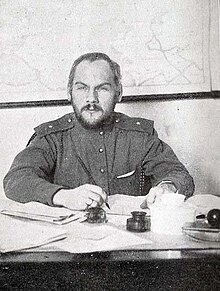This article includes a list of general references, but it lacks sufficient corresponding inline citations. (September 2011) |
Nikolai Krylenko | |
|---|---|
| Николай Крыленко | |
 Krylenko in 1918 | |
| People's Commissar for Justice of the USSR | |
| In office 20 July 1936 – 15 September 1937 | |
| Premier | Vyacheslav Molotov |
| Preceded by | None—position established |
| Succeeded by | Nikolay Rychkov |
| Prosecutor General of the Russian SFSR | |
| In office May 1929 – 5 May 1931 | |
| Premier | Alexey Rykov Vyacheslav Molotov |
| Preceded by | Nikolai Janson |
| Succeeded by | Andrey Vyshinsky |
| Chairman of the Supreme Court of the Soviet Union | |
| In office 28 November 1923 – 2 February 1924 | |
| Succeeded by | Alexander Vinokurov |
| Personal details | |
| Born | 2 May 1885 Bekhteevo, Sychyovsky Uyezd, Smolensk Governorate, Russian Empire |
| Died | 29 July 1938 (aged 53) Moscow, Russian SFSR, Soviet Union |
| Political party | RSDLP (Bolsheviks) (1904–1918) Russian Communist Party (1918–1938) |
| Spouse | Elena Rozmirovich |
| Relations | Elena Krylenko (sister) |
| Occupation | Lawyer, theorist, writer |
Nikolai Vasilyevich Krylenko (Russian: Никола́й Васи́льевич Крыле́нко, IPA: [krɨˈlʲenkə]; 2 May 1885 – 29 July 1938) was an Old Bolshevik and Soviet politician, military commander, and jurist. Krylenko served in a variety of posts in the Soviet legal system, rising to become People's Commissar for Justice and Prosecutor General of the Russian Soviet Federated Socialist Republic. He was executed during the Great Purge.
Krylenko was an exponent of socialist legality and the theory that political considerations, rather than criminal guilt or innocence, should guide the application of punishment. Although participating in the Show Trials and political repression of the late 1920s and early 1930s, Krylenko was later caught up as a victim and arrested during the Great Purge of the late 1930s. Following interrogation and torture[citation needed] by the NKVD, Krylenko confessed to extensive involvement in wrecking and anti-Soviet agitation. After a trial of 20 minutes, he was sentenced to death by the Military Collegium of the Soviet Supreme Court, and executed immediately afterwards.